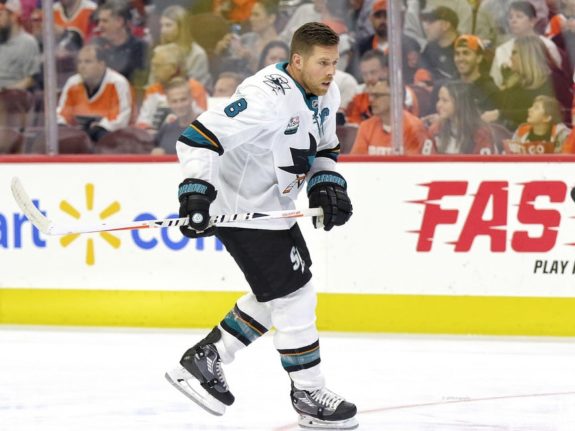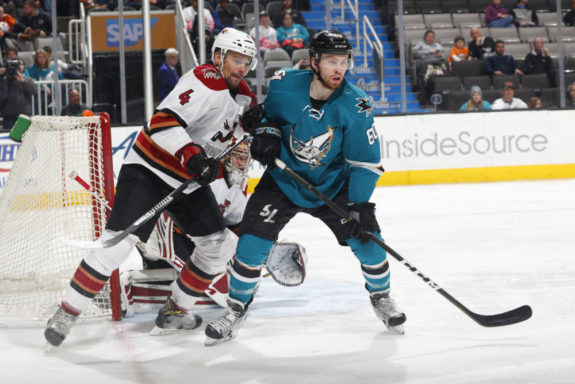![]()
For the San Jose Sharks, February is an important month. When March hits, just six road games will remain for the season. The team can effectively lock down a playoff spot with a strong month, though even a modest month will leave them in a very good position.
In February, the Sharks play a home game against the Arizona Coyotes to restart their season after 10 days off. They’ll then leave for a four-game road trip, covering the four teams in Western Canada. The Sharks return for a three-game homestand, then head to the east coast for a four-game road trip to finish the month. The lineup includes several good teams (Washington Capitals, Boston Bruins twice, Pittsburgh Penguins, Columbus Blue Jackets, Winnipeg Jets, Calgary Flames), but there is only one back-to-back game.
On the Ice
Over the rest of the season, the Sharks need to build towards the playoffs. What the team needs in February is different than what it will need in March. The key for February is to lower risks. The Sharks need to allow players with injuries to heal and to make sure they don’t create fatigue issues for their stars.
This translates to forwards Logan Couture, Joe Pavelski, Evander Kane and Tomas Hertl reducing their ice time a bit. Defensemen Erik Karlsson and Brent Burns could also use a reduction in their minutes. These players are expected to play major roles in the postseason, so there’s no need to risk burning them out in the regular season. Fewer minutes will also lower their injury risk. On the other hand, Brenden Dillon, Radim Simek, Barclay Goodrow and Lucas Radil are among the players whose average ice time can increase.

Starting goalie Martin Jones should play no more than two games out of every three, not three out of four (or more). This is the month to give backup goalie Aaron Dell the nets for a good portion of the games. We highlighted how Stanley Cup winning goalies rarely have a regular season workload inside the top-10. The Sharks need to work with the odds, not against them.
The Sharks should use the month to give depth players more NHL ice time, including some residing in the AHL on the San Jose Barracuda. Forwards Dylan Gambrell, Rourke Chartier, Antti Suomela and Francis Perron are among those who could see some NHL regular season work. Keeping defensemen Tim Heed and Joakim Ryan involved also makes sense.

Sharks head coach Peter DeBoer has a habit of shortening his bench in the final period of games; he should resist this temptation. Rolling four lines and three defensive pairs is the best approach and he has the talent to do this.
With many home games in March and a decent amount of time between some of the games, the Sharks will get sufficient practice time to sharpen up for the playoffs then. February doesn’t set up well for this. This is the month to reduce risks and give lower tier players a chance to show they are capable of taking a bigger role.
Sharks Management
Sharks general manager Doug Wilson has the trickier to-do list, though it consists largely of just two items. The first item is to figure out what available asset might be most helpful to a Sharks playoff run. We recently highlighted a pair of forwards, Wayne Simmonds of the Philadelphia Flyers and Carl Hagelin of the Los Angeles Kings, but Wilson may see other needs.
Goalie Martin Jones has struggled this season, and if Wilson believes Jones won’t be able to recover his game (perhaps there is an injury), he may want to add a goalie. Health plays a role across the lineup and any injuries can cause a change in approach. Power forwards and forechecking are at the top of my list.

However, Wilson is constrained by what he can offer. The Toronto Maple Leafs used a pair of prospects and a first-round pick to get Jake Muzzin, the defenseman they needed, from the Kings. The prospects the Leafs traded away weren’t expected to play a role in their upcoming playoff run and acquired a player who’ll be central to it.
The Sharks could not pull off a trade similar to that one. They are light on prospects and have few high draft picks. San Jose traded away or has conditions on their first round picks for the next three years. Wilson may get a useful piece for a playoff run, but more than likely, he’ll have to do it on the cheap.
The other item on Wilson’s ‘to-do’ list is even bigger. He’s probably figured out by now if Erik Karlsson will sign a new contract with the Sharks. Karlsson becomes eligible for an eight-year deal late in the month (he can only sign for seven years now). If he’ll stay with the Sharks, expect him to sign at the end of the month for the richest deal in team history.
Now is the time for Wilson and Karlsson to figure out the player’s future. My sense is this won’t come down to money. Karlsson is either happy to stay or has a sense he’ll be better off elsewhere. If he wants to stay in San Jose, the money will work out. If he doesn’t want to stay for the long run, the Sharks offer won’t matter.
Sharks’ February Needs
It may sound strange, but the Sharks don’t need to play at a particularly high level or win a ton of games this month. There are more critical things to do than win lots of games. Getting a dozen points in a dozen games isn’t particularly good (only seven of the league’s 31 teams average less than a point per game), but it’s likely good enough, given the modest records of the teams battling for the lower playoff spots.
The Sharks can tread water and still create the foundation for a playoff run. A better record is fine, but not necessary. A worse record, as long as its not a meltdown, is survivable. Using the roster wisely in February sets the team up for solid March and strong position for the playoffs.
Perhaps what matters most is what happens away from the ice. February is a critical month for Sharks management. Wilson effectively sets the Sharks roster for the rest of the season and playoffs. And he’ll either get a lengthy deal with the Sharks’ most important player or he won’t. Either way, there will be important news. Hopefully, the Sharks can check off these critical ‘to-do’ boxes.